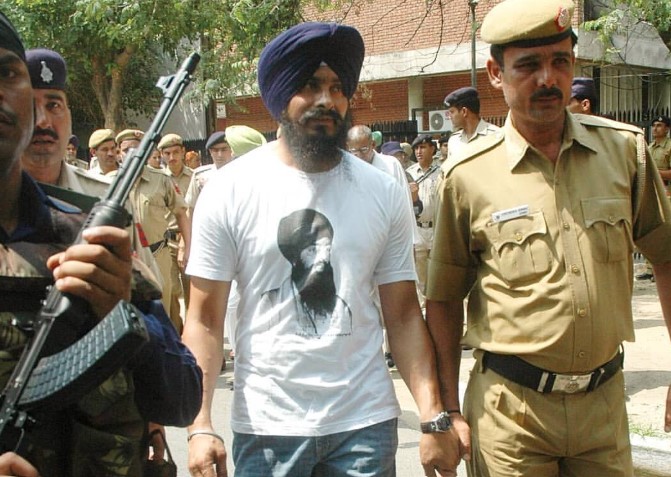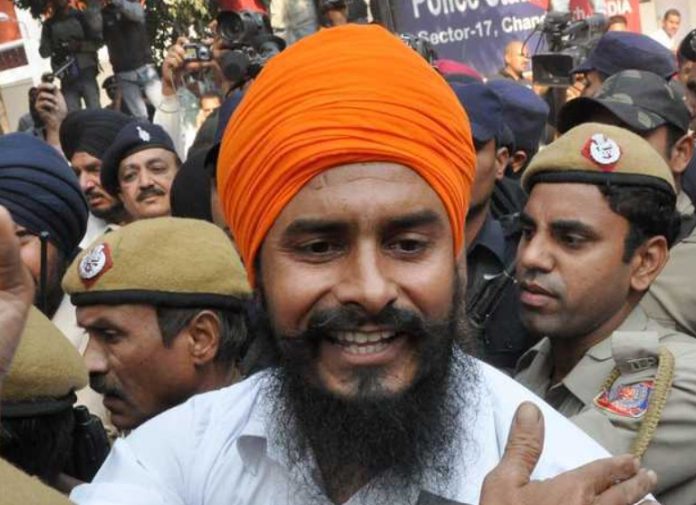Jagtar Singh Hawara, a prominent member of the Babbar Khalsa International, was convicted for his role in the assassination of former Punjab Chief Minister Beant Singh in 1995. Following his conviction, Hawara has been serving a life sentence in Delhi’s Tihar Jail. In a recent legal development, he petitioned the Supreme Court of India, seeking a transfer from Tihar Jail to a prison in Punjab. This request has garnered significant attention, especially given the opposition from the Punjab government.
Background of the Case
On August 31, 1995, a suicide bombing outside the Punjab Civil Secretariat in Chandigarh resulted in the death of Chief Minister Beant Singh and 16 others. The attack was a pivotal moment in Punjab’s history, marking the culmination of a series of violent incidents during a tumultuous period. Hawara was arrested on September 21, 1995, and subsequently tried and convicted for his involvement in the assassination. In 2007, a special Central Bureau of Investigation (CBI) court sentenced him to death. However, in October 2010, the Punjab and Haryana High Court commuted his sentence to life imprisonment, specifying that he would remain incarcerated for the rest of his life.
Hawara’s Petition for Transfer
In his petition to the Supreme Court, Hawara, now 54, has requested a transfer from Tihar Jail to any prison in Punjab. He cites several reasons for this request:
- Good Conduct: Hawara asserts that, except for an alleged jailbreak in 2004, his behavior in prison has been exemplary. He escaped from Burail Jail in Chandigarh in 2004 but was re-arrested in 2005. Since then, he claims to have maintained a spotless record during his incarceration.
- Proximity to Family: Being a native of Fatehgarh Sahib district in Punjab, Hawara wishes to be closer to his family. He emphasizes that his daughter and extended family reside in Punjab, and a transfer would facilitate family visits and support.
- Legal Proceedings: Hawara points out that there are no pending cases against him in Delhi. He argues that being housed in a Punjab prison would allow him better access to legal representation for any ongoing or future legal matters within the state.
The petition, filed through advocate Satya Mitra, also seeks the production of his complete prison records to substantiate his claims of good conduct.

Supreme Court’s Response
On September 27, 2024, a bench comprising Justices B.R. Gavai and K.V. Viswanathan of the Supreme Court issued notices to the Centre, and the governments of Delhi and Punjab, seeking their responses to Hawara’s petition. The court has scheduled the next hearing for four weeks later.
During the hearing, Justice Gavai inquired about the 2004 jailbreak, asking senior advocate Colin Gonsalves, representing Hawara, about the details of the escape. Gonsalves responded by noting the significant passage of time since both the assassination and the jailbreak, emphasizing Hawara’s subsequent good behavior.
Punjab Government’s Opposition
The Punjab government has expressed its opposition to Hawara’s transfer to a state prison. The primary concerns include:
- Security Risks: Given Hawara’s history, including the 2004 jailbreak, the state government is apprehensive about potential security challenges. They argue that housing him in a Punjab prison could pose risks, both in terms of possible escape attempts and the potential for him to influence or mobilize extremist elements within the state.
- Law and Order: The government fears that Hawara’s presence in a Punjab prison could become a focal point for radical elements, potentially leading to unrest or attempts to rally support around his cause.
- Precedent: There is also concern that approving such a transfer could set a precedent for other high-profile convicts seeking relocations, which might complicate the management of the prison system and associated security protocols.
Legal and Social Implications
Hawara’s petition brings to the forefront several legal and ethical considerations:
- Rights of Prisoners: The petition raises questions about the rights of prisoners to be incarcerated close to their families and the role of good conduct in determining prison assignments.
- Security vs. Rehabilitation: Balancing the security concerns of the state with the rehabilitative needs and rights of the prisoner is a complex issue. While Hawara emphasizes his good behavior and the desire to be near his family, the state underscores the potential risks associated with his transfer.
- Judicial Precedents: The Supreme Court’s decision on this matter could set a significant precedent for future cases involving prisoner transfers, especially those convicted of high-profile crimes.
Public and Political Reactions
The case has elicited varied reactions from different quarters:
- Victims’ Families: Families of the victims of the 1995 bombing have expressed their anguish and opposition to any leniency towards Hawara. They argue that his actions caused irreparable harm and that he should remain in a high-security facility.
- Human Rights Activists: Some activists advocate for Hawara’s transfer, citing his prolonged incarceration and the importance of prisoner rights, including the right to be near family.
- Political Entities: Various political parties and leaders have weighed in, with opinions often reflecting broader ideological stances on issues of justice, rehabilitation, and security.
As the Supreme Court deliberates on Jagtar Singh Hawara’s petition, it must navigate a complex interplay of legal rights, security concerns, and ethical considerations. The outcome will not only impact Hawara’s incarceration conditions but could also influence future policies and judicial decisions regarding prisoner rights and state security. The case underscores the delicate balance between upholding justice and ensuring humane treatment within the penal system.


